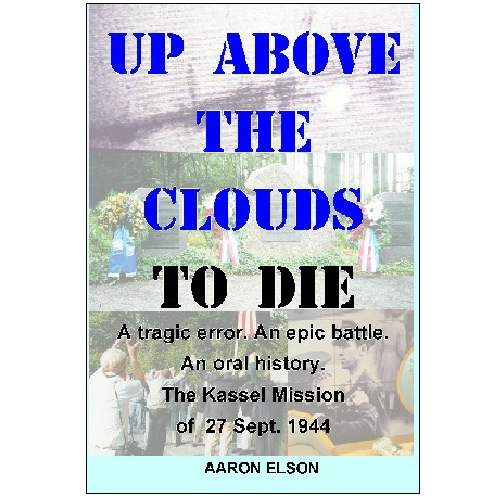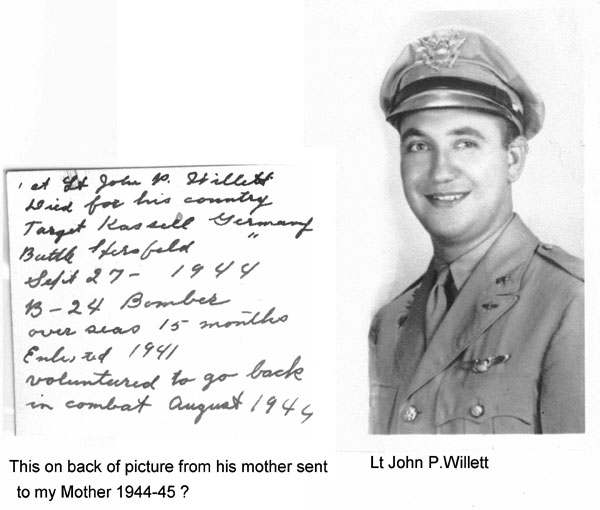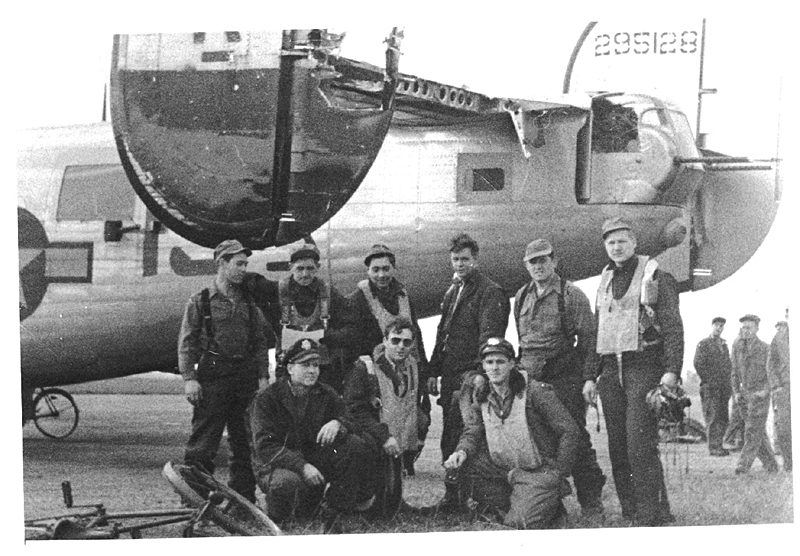



The Bonnie Vee (excerpt)
Lieutenant William S. Bruce was the pilot of the Bonnie Vee, which was named after his wife, Verlyn. He sent this written account of the battle to George Collar.
As I recall, we had heavy cloud cover, and would drop our bombs by radar or pathfinder ships (these were radar-equipped planes that led us to the target in case of bad weather).
There was some confusion as to the proper target — finally we were on the bomb run and dropped our bombs, dove down 500 feet and headed for England. At this point we had only flak to contend with. After a short while we saw what appeared to be our own P-51 escorts, which we had not seen all morning. However, there were so many of them that too late we knew they had to be German ME-109s [also Focke-Wulf 190s]. They sure were. It was just unbelievable how many enemy fighters came at us in large groups — sat back and below us and shot the living hell out of us. They had their wheels down — stayed in formation and raked us steadily with machine gun fire and 20-mm cannon.
We had to have our tail and waist gunners fire at the ME-109s who were shooting at our wingmen simply because we could not get the ones on our tail.
It was just a hopeless situation — there were just too many of the enemy fighters. I saw at least seven ships go down in flames; four of our group and several German ships. Our fighters were nowhere in sight. I could not understand where the hell they could be.
Our ship, the Bonnie Vee, had been hit several times — two engines were on fire and the interior of the plane was in shambles. The gunners kept firing, but finally they were all wounded or dead. At this time I knew we were in serious trouble with no hope of flying any longer. I finally gave the bailout order because at this moment only one engine was running and not too well at that.
I asked my co-pilot to unbuckle my seat belts before he bailed out. Just as he stood up to do so, a 20-mm cannon shell cut him in half.

At this point I really knew it was the end of our flight. The right wing was rammed by a German fighter, tearing it off. Next, the left wing blew up and only the fuselage remained. We were then at 19,000 feet. It must have just exploded because the next thing I knew I was clear of the plane and hurting very, very much.
I did not open my parachute for a number of reasons. One, I was on fire or so I thought. Two, I figured the fighters would shoot at me. And third, I was kind of groggy and covered with blood.
After what seemed an eternity, I saw a farmer plowing his fields. I pulled the ripcord. The chute opened and I hit a very large tree within four or five seconds. My right leg was hung up over a branch and wrapped around my neck. It took me some time to untangle myself and climb down this fifty foot tree.
By this time what was left of my ship crashed into the forest not too far from me along with several others, causing a massive forest fire. No one evidently saw my chute — however, I heard a lot of yelling and screaming about something. It was probably about the fire. Several dogs growled at me but were finally called by their owners.
It took me about ten hours crawling through the trees and along the stone walls to find a house. At this time I knew I was badly hurt — could not stand up — covered with blood and really, really hurting.
I crawled along a fence to a farmhouse. A man and two women came out and carried me into the house. They tried to wash my face and give me some milk but I could not even swallow. I think they thought i was dying and I wasn’t so sure I wasn’t,
After a few minutes their grandson (I guess) who was about 10 or 12 years old came in and pointed a small rifle at me. His grandfather knocked it out of his hands. With that, the little bastard ran out of the house and returned with seven soldiers all carrying sub-machine guns, or what I know now as burp guns.
Their fear of me was incredible. They pointed their guns at me and started yelling. Not being able to move, and lying flat on my back, I certainly did not pose a threat to them. Finally one officer, after trying to communicate with me, spoke in French. This I understood. He questioned me as to whether I was carrying a pistol — I said “No.” Then he searched me and was satisfied that I wasn’t going to shoot them all,

Next he wanted to know the Bomber Group I was in and what type of plane I was flying. I gave only my name, rank and serial number as we had been instructed in situations such as this. Thirty minutes went by — same questions, same answers.
Soon several other German officers arrived and put me in a horse-drawn open farm wagon. We proceeded to drive to a village where it seemed like half the German population had gathered. I certainly was the center of attention. They cursed me — spit on me — hit me with rocks — sticks — fists and anything else they happened to have handy. Finally after the officer had had the glory of capturing me, they put me in a small barn. I really thought I was dying at this time. The crowd did not let up on me and continued to throw stones through the widows and pound on the walls.
After about three hours everybody left. I spent the rest of the night awake and hurting. About daylight the officers returned and asked me the same questions over and over — same response from me. Finally one of them hit me in the jaw with a pistol butt — fracturing it. I was carried out by four soldiers and we spent three days on the train, arriving at Frankfurt for two more days of intensive interrogation. By this time I had become almost totally paralyzed and was black and blue all over.
The Germans finally gave up and once again, under guard and on a stretcher, we spent the next week on a train, arriving at Obermasfeld, where a doctor finally examined me. I was told that my right pelvis was broken, my right shoulder was badly damaged and that I would not ever walk again or use my right arm. (Later, back in the States, I was told that my neck was also broken.) The next week they shipped me to Mennigod Hospital because the Germans had to make room for all the German soldiers wounded at Arnhem.